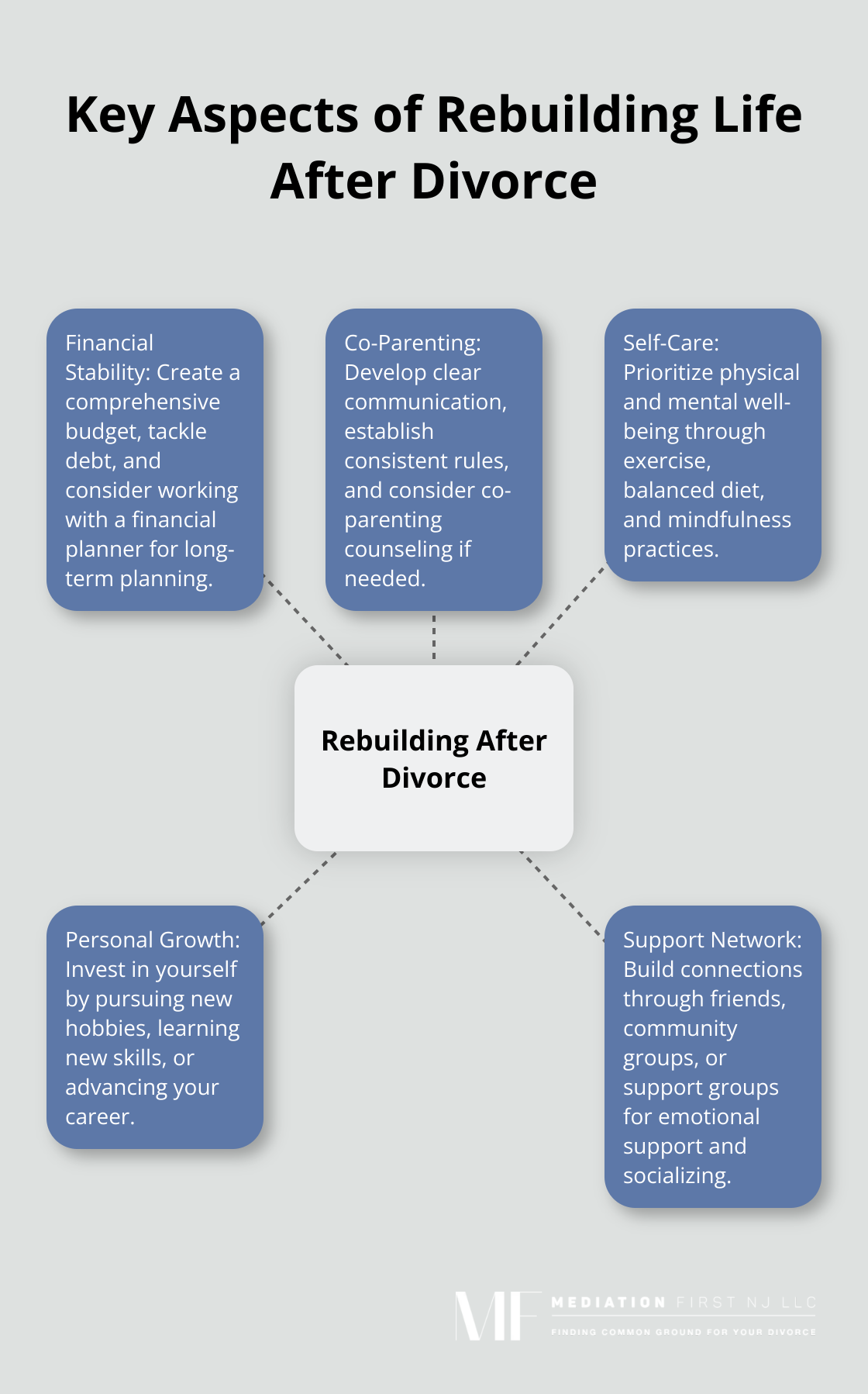At Mediation First NJ LLC, we understand that divorce and remarriage are complex life events that require careful navigation. These transitions often bring a mix of emotions, legal challenges, and personal growth opportunities.
Our practical guide aims to help you through each stage of the process, from understanding the emotional aspects of divorce to preparing for a new chapter in remarriage. We’ll provide actionable strategies and insights to support you on this journey.
How Divorce Impacts You Emotionally and Legally
The Emotional Rollercoaster of Divorce
Divorce triggers a range of intense emotions. You might experience shock, denial, anger, bargaining, and depression before you reach acceptance. These feelings aren’t linear and can fluctuate over time. It’s normal to feel overwhelmed, anxious, or even relieved at different stages of the process.
Many people report a sense of failure or guilt during divorce. These emotions can be particularly intense if children are involved. It’s important to acknowledge these feelings and seek support when needed. Talking to a therapist or joining a support group can provide valuable coping strategies.
Navigating the Legal Landscape
The legal aspects of divorce present their own challenges. You’ll need to make important decisions about asset division, child custody, and potential alimony or child support. These decisions have long-term implications, so it’s vital to approach them with a clear head.
One of the first steps involves gathering all relevant financial documents. This includes bank statements, tax returns, and information about any shared assets or debts. Having this information organized can streamline the process and help you make informed decisions.
Mediation: A Path to Smoother Divorce
Mediation offers several advantages over traditional litigation:
- It’s typically faster and less expensive than going to court, with costs usually between $3,000 and $8,000.
- It allows you to maintain control over the outcome rather than leaving decisions to a judge.
- It can help preserve a more amicable relationship with your ex-spouse (which is particularly beneficial if you have children).
During mediation, a neutral third party helps you and your spouse communicate effectively and work towards mutually acceptable solutions. This process can help reduce conflict and stress, making the emotional journey of divorce a bit easier to navigate.

Self-Care During Divorce
As you navigate the emotional and legal aspects of divorce, prioritize self-care. Regular exercise, a healthy diet, and adequate sleep can help you manage stress and maintain emotional balance. Try picking up a new hobby or rekindling an old passion as a positive outlet for your emotions.
Divorce is a process, not an event. It takes time to work through both the emotional and legal aspects. Be patient with yourself and don’t hesitate to seek professional help when needed. With the right support and approach, you can navigate this challenging time and emerge stronger.
Preparing for the Next Steps
As you work through the emotional and legal aspects of divorce, it’s important to start thinking about rebuilding your life. This includes developing a post-divorce financial plan, creating strategies for effective co-parenting, and focusing on personal growth. In the next section, we’ll explore these topics in detail to help you prepare for life after divorce.
How to Rebuild Your Life After Divorce
Create a Solid Financial Foundation
The first step in rebuilding your life involves establishing financial stability. Start by creating a comprehensive budget that reflects your new financial reality. Track your income and expenses meticulously for at least three months to get a clear picture of your spending habits.
Next, tackle any debt you may have accumulated during or after the divorce. The snowball method (where you pay off the smallest debts first while maintaining minimum payments on larger ones) can be an effective strategy. This approach provides quick wins and motivation to continue your debt-reduction journey.
Consider working with a financial planner to develop a long-term financial plan. They can help untangle the web of marital finances, assess income, expenses, and ensure you’re adequately prepared for the future.
Master Co-Parenting Challenges
If you have children, developing a strong co-parenting relationship with your ex-spouse is essential. Effective co-parenting starts with clear, respectful communication. Use a co-parenting app or shared calendar to keep track of schedules, important events, and expenses related to your children.
Consistency provides stability for your children during a time of significant change. Work with your ex-spouse to establish similar rules and routines in both households.
When conflicts arise, focus on problem-solving rather than blame. If you struggle to communicate effectively, consider working with a co-parenting counselor. These professionals can help improve your ability to work together for the benefit of your children.
Prioritize Self-Care and Personal Growth
Divorce can be emotionally draining, making self-care more important than ever. Regular exercise, a balanced diet, and adequate sleep form the foundation of physical and mental well-being. Try mindfulness practices like meditation or yoga to manage stress and improve emotional regulation.
This is also an opportune time for personal growth. Reflect on your experiences and identify areas where you’d like to improve or develop new skills. Maybe you’ve always wanted to learn a new language or pursue a hobby you set aside during your marriage. Now is the time to invest in yourself.
Professional development can also be a powerful way to rebuild your life. Take courses to enhance your career prospects or explore new professional paths. According to the Bureau of Labor Statistics, individuals with additional certifications or advanced degrees often see increased earning potential, which can provide greater financial stability post-divorce.
Build a Robust Support Network
Surrounding yourself with supportive people is crucial during this transition. Reconnect with old friends, join community groups, or attend divorce support groups. These connections can provide emotional support, practical advice, and opportunities for socializing.

Don’t hesitate to seek professional help if you’re struggling emotionally. A therapist can provide tools to process your emotions, build resilience, and develop healthy coping mechanisms. Studies show that individuals who seek therapy after divorce report higher levels of life satisfaction and better adjustment in the long term.
As you work through rebuilding your life after divorce, you may start to consider the possibility of a new relationship. The next chapter will explore how to prepare for remarriage, including evaluating your readiness and addressing common concerns.
For those facing significant relationship challenges, counseling or divorce mediation services can be invaluable resources to rebuild trust and navigate complex emotions. These services can also help you develop strategies for building a lasting relationship in the future, supported by practical advice and data-driven insights.
Are You Ready for Remarriage?
Assessing Your Emotional Readiness
Before you commit to a new marriage, take time for honest self-reflection. Ask yourself if you’ve fully processed the emotions from your previous relationship. A study found that certain marital issues, including activities, affection, conflict, and stability, worsened over time in remarriages.
Consider professional counseling to work through any lingering issues. A divorce coach can help you identify patterns from your past relationship and develop strategies for healthier interactions in your new one. This step becomes particularly important if you still harbor anger or resentment towards your ex-spouse.
Addressing Common Fears
It’s normal to have concerns about remarriage. Many individuals worry about repeating past mistakes or fear another failure. Acknowledge these fears and discuss them openly with your partner. Transparency builds trust and can strengthen your relationship.
Financial worries often top the list of concerns. A recent survey found that 36.7% of couples cited money issues as a reason for divorce. To address this, have frank discussions about money management, debt, and financial goals before remarrying.
Navigating Blended Families
If you or your partner have children from previous relationships, blending families requires extra care and planning. The American Psychological Association reports that it typically takes 5-7 years for a blended family to feel fully integrated.
Start by having open conversations with your children about the upcoming changes. Listen to their concerns and involve them in decision-making where appropriate. Establish clear rules and boundaries, but remain flexible as everyone adjusts to the new family dynamic.
Family counseling can help navigate this transition. A professional can provide strategies for addressing common challenges like sibling rivalries or conflicts over parenting styles.
Financial Considerations and Prenuptial Agreements
Remarriage often involves more complex financial situations than first marriages. Be transparent about your assets, debts, and financial obligations. Discuss how you’ll manage finances as a couple and create a budget that accounts for any child support or alimony payments.
A prenuptial agreement can provide clarity and protection for both parties. While it might seem unromantic, it can actually foster trust by addressing potential issues upfront. A survey by the American Academy of Matrimonial Lawyers revealed that 62% of divorce attorneys reported an increase in prenuptial agreements over a three-year period.
When drafting a prenuptial agreement, try working with a mediator. A neutral third party can facilitate these discussions in a non-adversarial environment, ensuring both parties feel heard and protected. Mediation can also help you avoid lengthy court battles and settle matters privately, which can be beneficial for both your emotional well-being and your finances.

Final Thoughts
Divorce and remarriage present complex challenges that require patience and self-reflection. You must prioritize your emotional well-being and seek support when needed. Healing takes time, so move at your own pace through this process.
Focus on self-care and personal development as you navigate the stages of divorce. Establish a strong financial foundation, address co-parenting challenges, and invest in your own growth. These steps will help you recover and prepare for a potentially happier future.
Take time to assess your emotional readiness and address concerns before remarriage. Open communication with your partner about expectations and family dynamics is essential. Mediation First NJ LLC offers mediation services to help you navigate divorce and family-related disputes constructively (and cost-effectively).

